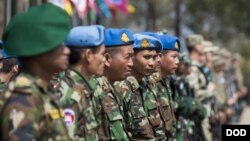United Nations peacekeeping missions are critical to assisting war-torn countries get back on their feet, and to transition from conflict to peace.
For over 60 years now, UN peacekeeping missions have operated in some of the most dangerous and difficult environments in the world, dealing with conflicts and their aftermath the world over. In that time, 126 countries have contributed peacekeepers to the United Nations. Given the wide spectrum of cultures involved, in order to be successful in their common endeavor, they must train together.
“Now, more than ever, there is a growing global demand for trained peacekeeping personnel,” writes Andrew Strike of the U.S. State Department’s Bureau of Political-Military Affairs in a recent blog post. “International stability requires peace operations, and peace operations require well-trained, effective peacekeepers.”
That is why, in late March and early April, the Government of Nepal and the United States Pacific Command co-hosted Shanti Prayas III, a multinational peacekeeping exercise that brought together participants from over 30 countries.
“Partnerships play a critical role in meeting global challenges, from maintaining peace to providing humanitarian assistance after natural disasters,” said U.S. Ambassador to Nepal Alaina Teplitz. “This kind of multinational training can deepen mutual understanding and respect and encourage further collaboration if we’re doing it right and we’re committed to this mission.”
The Shanti Prayas III, which translates as Peace Endeavor, is supported by the U.S. Global Peace Operations Initiative, a U.S. Government-funded security assistance program that aims to strengthen international peacekeeping capacity in support of United Nations and regional peace operations. The Initiative provides the capacity building support to help countries around the world contribute to the establishment of international peace and security.
“The United States is committed to U.N. peacekeeping missions, mandates and tasks that support the rules-based international order…a system that benefits all nations,” said Admiral Harris, head of U.S. Pacific Command. “That’s why we continue to work together with partners from the countries [represented at Shanti Prayas III].”




